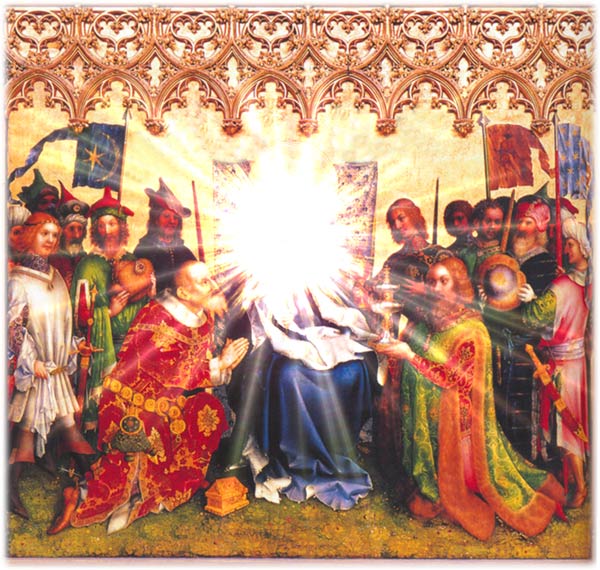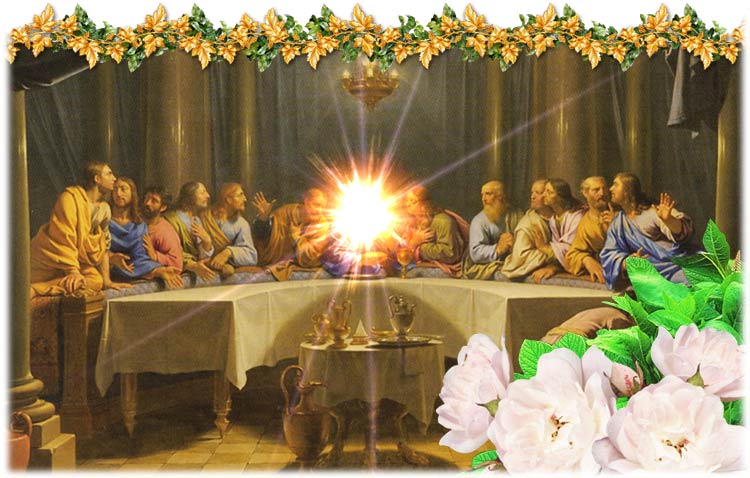Stephan Lochner, Cologne Cathedral, 1440-1450
Christianity is divided into various denominations, which, over time, became divided into different branches. Each of these different branches interprets the New Testament in its own way and has developed its own practices. However, the great majority of them consider the trinity to be the essence of their belief.
A few of these groups rejected this belief and, as a result, were fought and persecuted as heretics by the proponents of the trinity, who were always in the majority and gradually converted the Christian world, forcibly or otherwise, to this belief. Apart from certain minority groups we shall be seeing in the sections that follow, the belief in the trinity was generally accepted in, or imposed on, the Christian world.
As has been made clear from the start of this book, belief in the trinity is in complete contradiction to the Qur'an. Statements in the New Testament clearly reveal that at no time did Prophet Jesus (pbuh) ever make such a claim, or even implied that he was part of a triune God. Personally, he always praised and glorified God. In any case, this is one area on which present-day opponents of belief in the trinity concentrate the most—on the fully human nature of Prophet Jesus (pbuh).
For centuries, the information in the New Testament about Prophet Jesus' (pbuh) life, message, and wise advice has been ignored, because belief in the trinity confuses people to such an extent that they accord him divine status and hope that he will help them.
According to the Qur'an, Prophet Jesus (pbuh) is a messenger sent by God to warn people and to perform the miracles that He willed until his ascension to God's presence. Although born in a miraculous fashion, he lived like all other people. Like them, he came into existence by God saying Be! and, as a human being, realized his complete dependency upon God. His human characteristics are described, with various examples, in the Qur'an and the New Testament. For example, our Lord states in Surat al-Ma'ida:75 that Prophet Jesus (pbuh) and Mary ate food, meaning that they were not angels, but human beings just like everyone else.
 Stephan Lochner, Cologne Cathedral, 1440-1450 |
There are many examples of references to Prophet Jesus' (pbuh) human characteristics in the New Testament. Some of these are as follows:
The New Testament contains several statements about Prophet Jesus' (pbuh) lineage and birth: He (pbuh) is descended from the line of Prophet David (pbuh), and was born and raised (in other words, known) among his people.
He has raised up a horn of salvation for us in the house of His servant David (as he said through his holy prophets of long ago), salvation from our enemies and from the hand of all who hate us … (Luke 1:69-71)
A record of the genealogy of Jesus the son of David, the son of Abraham … (Matthew 1:1-2)
Then Jesus' mother and brothers arrived. Standing outside, they sent someone in to call him. (Mark 3:31)
The crowds that went ahead of him and those that followed shouted: "Hosanna to the Son of David! Blessed is he who comes in the name of the Lord! Hosanna in the highest!" When Jesus entered Jerusalem, the whole city was stirred and asked: "Who is this?" The crowds answered: "This is Jesus, the prophet from Nazareth in Galilee." (Matthew 21:9-11)
… Isn't this the carpenter? Isn't this Mary's son and the brother of James, Joseph, Judas, and Simon? Aren't his sisters here with us?" (Mark 6:3)
A mentality that ignores Prophet Jesus' (pbuh) human characteristics lies at the heart of trinitarianism. The fact is, however, the New Testament makes it clear that Prophet Jesus (pbuh) is not the Son of God, but rather His messenger who lived a regular human life. He was born and lived as an infant, a child, and an adult. When he felt hungry, he ate with his disciples and thanked God for the food. After a long day of activity, he felt tired and needed to sleep. In addition, the people around him saw him wash and cleanse himself. All of these are natural needs that a person has to meet. Moreover, meeting such needs completely contradicts his supposed divinity.
 Jean-Baptiste de Champaigne, The Last Supper, 1631-1681 |
And Jesus grew in wisdom and stature, and in favor with God and people. (Luke 2:52)
When he [Jesus] was at the table with them, he took bread, gave thanks, broke it, and began to give it to them. (Luke 24:30)
And while they still did not believe it, because of [their] joy and amazement, he asked them: "Do you have anything here to eat?" They gave him a piece of broiled fish, and he took it and ate it in their presence. (Luke 24:41-43)
On the first day of the Feast of Unleavened Bread, the disciples came to Jesus and asked: "Where do you want us to make preparations for you to eat the Passover?"(Matthew 26:17)
While Jesus was having dinner at Levi's house … (Mark 2:15)
Then Jesus entered a house, and again a crowd gathered, so that he and his disciples were not even able to eat. (Mark 3:20)
While they were reclining at the table eating, he [Jesus] said: "I tell you the truth, one of you will betray me—one who is eating with me." (Mark 14:18)
Now one of the Pharisees invited Jesus to have dinner with him, so he went to the Pharisee's house and reclined at the table. (Luke 7:36)
Jesus, tired from the journey, sat down by the well. It was about the sixth hour. When a Samaritan woman came to draw water, Jesus asked her: "Will you give me a drink?"(John 4:6-7)
Jesus was in the stern, sleeping on a cushion. (Mark 4:38)
Then, because so many people were coming and going that they did not even have a chance to eat, he [Jesus] said to them: "Come with me to a quiet place and get some rest."(Mark 6:31)
These passages reveal that Prophet Jesus (pbuh) was a human being who stood in need of God's mercy, just like every other person. He was a servant of God with very superior moral values, and was made superior to the worlds by Him, honored with the rank of prophet, and blessed with miracles. He was a man with select characteristics, and yet at the same time a helpless servant in need of His mercy. But God, the Creator of all that exists, whether living or not, is eternal, controls all things, knows everything, has the power to do anything, and never sleeps. Unsullied by any helplessness, He gave various forms of helplessness to all members of creation and told them to be aware of these inadequacies, serve only Him, and seek everything from Him.
Both the Qur'an and the New Testament relate Prophet Jesus' (pbuh) miracles, which were performed with God's infinite blessing. After every miracle, however, he made it clear to everyone that these miracles occurred because God willed them to occur. He frequently stated that God was speaking, not him, and that He caused everything to happen, for He is the Only Lord over all living things. He emphasized that he was no more than a servant who had been sent to tell his people of God's message, that what he did he did by the will of God, and that all of his actions were under God's control. For example:
All things have been given to me by my Lord. (Matthew 11:27)
I do exactly what God has commanded me [to do]. (Matthew 14:31)
The words I say to you are not just my own. (John 14:10)
I tell you the truth, the apostle can do nothing by himself. (John 5:19)
My teaching is not my own. It comes from Him Who sent me. (John 7:16)
My Lord, Who has given them to me, is greater than all. (John 10:29)
For I did not speak of my own accord, but God, Who sent me, told me what to say and how to say it. I know that His command leads to eternal life. So whatever I say is just what God has told me to say. (John 12:49-50)
Jesus knew that God had put all things under his power, and that he had come from God and was returning to God. (John 13:3)
The One Who sent me is with me; He has not left me alone, for I always do what pleases Him. (John 8:29)
By myself I can do nothing; I judge only as I hear, and my judgment is just, for I seek not to please myself but He Who sent me. (John 5:30)
No one can come to me unless the Lord has enabled him:her [to do so]. (John 6:65)

The above extracts from the Gospels are of the greatest importance in terms of the belief in the trinity, for they were all spoken by Prophet Jesus (pbuh) to let the people know that he was not a deity (Surely God is beyond that!), but rather a servant who needed God, acted in the way desired by God, decided in the manner commanded by God, spoke with the inspiration of God, and performed deeds of which God will approve. Moreover, all of these wise and sincere statements deny trinitarianism, whose followers seek to portray Prophet Jesus (pbuh) as a superior being who has no need of anything in order to exist. Not only does such a mistaken assertion not reflect the truth, but it also reflects a disrespectful attitude toward the glorious essence of our Lord and toward Prophet Jesus (pbuh), His great messenger. Our Lord is unsullied by such comparisons, for He is God, Who needs nothing, is without any flaw or deficiency, and is the eternal and only power. No thing or person can be equivalent to Him.
From this statement, it can be seen that Prophet Jesus (pbuh) meets only those stipulations regarding serving God. You can see, then, how truly superstitious the belief in the trinity is, since it regards Prophet Jesus (pbuh), who merely serves God, as being equivalent to God himself. (Surely God is beyond that!)
 God's command is coming, so do not try to hasten it. Glory be to Him! He is exalted above anything they associate with Him. (Surat an-Nahl: 1) |
Prophet Jesus' (pbuh) prayers also refute the belief in the trinity. People who pray is assumed to have accepted God's existence and Oneness, their helplessness before Him, and that only He can help them and is worthy of their worship. Prayer is one of the most pleasing forms of submission to God and of awareness of one's helplessness. Our Lord is unsullied by any imperfection, for He is the Lord of infinite might, Who possesses all power and therefore has no needs. Aid and forgiveness can be sought only from God. Everyone stands in need of Him, but He Himself stands in need of no one. The prayers of Prophet Jesus (pbuh) are the most devout indications of his submission to God and his powerful fear [and respect] of Him. According to the Gospels, Prophet Jesus (pbuh) prayed both to thank our Lord and to seek His help, for he knew that only God could grant his requests:
Going a little farther, he fell with his face to the ground and prayed. (Matthew 26:39)
… and he directed the people to sit down on the grass. Taking the five loaves and the two fish and looking up to heaven, he gave thanks. (Matthew 14:19)
After he had dismissed them, he went up on a mountainside by himself to pray. When evening came, he was there alone. (Matthew 14:23)
Very early in the morning, while it was still dark, Jesus got up, left the house, and went off to a solitary place, where he prayed. (Mark 1:35)
After leaving them, he went up on a mountainside to pray. (Mark 6:46)
Jesus said to his disciples: "Sit here while I pray." (Mark 14:32)
One of those days Jesus went out to a mountainside to pray, and spent the night praying to God. (Luke, 6:12)
One day Jesus was praying in a certain place. When he finished, one of his disciples said to him: "Teacher, teach us to pray, just as John taught his disciples." (Luke 11:1)
But I have prayed for you… that your faith may not fail. And when you have turned back, strengthen your brothers. (Luke 22:32)
One of his prayers, as recorded in the Qur'an, recalled the most beautiful titles of God:

And God replied:
Prophet Jesus (pbuh) called upon God to perform this miracle, for he knew that he had no personal or independent power to perform it. He was only a servant charged with showing the people God's infinite art of creation.
Trinitarianism's core belief consists of asserting that Prophet Jesus (pbuh) is not just a messenger sent to his people, but that he is the actual physical son of God. (Surely God is beyond that!) The fact is, however, that the New Testament describes him as a messenger who calls people to believe and submit to God. In his message, Prophet Jesus (pbuh) always insists that he is a sent messenger. The way that he tells God, I have given them Your word… (John, 17:14) is particularly striking. He is a prophet, just as Solomon, Moses, David (peace be upon them all), and Muhammad (may God bless him and grant him peace) were, a messenger who only communicates the message of God. Indeed, the New Testament records that Moses (pbuh) said: God will send you a prophet like me from your own people (Acts, 7:37). Some of the statements in the New Testament verifying Prophet Jesus' status as a prophet are as follows:
He who does not love me will not obey my teaching. These words you hear are not my own; they belong to God, Who sent me. (John 14:24)
Do not believe me unless I do what my Lord does. But if I do it, even though you do not believe me, believe the miracles. (John 10:37-38)
After the people saw the miraculous sign that Jesus did, they began to say: "Surely this is the prophet who is to come into the world." (John 6:14
He was a prophet, powerful in word and deed before God and all the people. (Luke 24:19)
They do not know the One Who sent me. (John 15:21)
He [God] sent him first to you to bless you by turning each of you from your wicked ways. (Acts 3:26)
Now this is eternal life: that they may know You, the only true God, and Jesus, whom You have sent. I have brought You glory on Earth by completing the work You gave me to do…I have revealed You to those whom You gave me out of the world. They were Yours; You gave them to me, and they have obeyed Your word. Now they know that everything You have given me comes from You, for I gave them the words You gave me, and they accepted them. They knew with certainty that I came from You, and they believed that you sent Me. (John 17:3-8)
I tell you the truth, whoever accepts anyone I send accepts me; and whoever accepts me accepts the One Who sent me. (John 13:20)
I am not here on my own, but He Who sent me is true. You do not know Him, but I know him because I am from Him and He sent me. (John 7:28-29)
Jesus replied: "Let us go somewhere else—to the nearby villages—so I can preach there also. That is why I have come. (Mark 1:38)
Jesus answered: "The work of God is this: to believe in the one He has sent." (John 6:29)
… for the one whom God has sent speaks the words of God. (John 3:34)
He Who sent me is reliable, and what I have heard from Him I tell the world. (John 8:26)
But he [Jesus] said to them: "I have food to eat that you know nothing about." Then his disciples asked each other: "Could someone have brought him food?" "My food," said Jesus, "is to do the will of Him Who sent me and to finish His work." (John 4:32-34)
According to trinitarian belief, faith in Prophet Jesus (pbuh) is the precondition of Christianity, and whoever rejects this doctrine is not a true Christian. Yet there are clear statements in the New Testament that undermine these claims. In particular, Prophet Jesus' (pbuh) message is built on calling people to have faith in God alone, for he resolves the people's questions and doubts by calling on them to submit to God. For example:
Jesus answered: "It is written: 'Worship the Lord your God and serve Him only.'"(Luke 4:8)
I tell you the truth. Whoever hears my word and believes Him Who sent me has eternal life and will not be condemned; he has crossed over from death to life. (John 5:24)
No one can serve two masters. Either he will hate the one and love the other, or he will be devoted to the one and despise the other. You cannot serve both God and money. (Matthew 6:24)
Jesus replied: "Love the Lord your God with all your heart, with all your soul, and with all your mind." (Matthew 22:37)
A teacher of the law came and heard them debating. Noticing that Jesus had given them a good answer, he asked him: "Of all the commandments, which is the most important?" "The most important one," answered Jesus, "is this: 'Hear, O Israel, the Lord our God, the Lord is One. Love the Lord your God with all your heart, with all your soul, with all your mind, and with all your strength.' The second is this: 'Love your neighbor as yourself.' There is no commandment greater than these." "Well said, teacher," the man replied. "You are right in saying that God is One and there is no other but Him." (Mark 12:28-32)
So they took away the stone. Then Jesus looked up and said: "Lord, I thank you that You have heard me. I knew that You always hear me, but I said this for the benefit of the people standing here, that they may believe that You sent me." (John 11:41-42)
Then Jesus cried out: "When a man believes in me, he does not believe in me only, but in the One Who sent me. When he looks at me, he sees the One Who sent me. I have come into the world as a light, so that no one who believes in me should stay in darkness. As for the person who hears my words but does not keep them, I do not judge him, for I did not come to judge the world, but to save it. There is a judge for the one who rejects me and does not accept my words; that very word that I spoke will condemn him on the Last Day, for I did not speak of my own accord, but God, Who sent me, told me what to say and how to say it. I know that his command leads to eternal life. So whatever I say is just what God has told me to say." (John 12:44-50)

These statements clearly state that Prophet Jesus (pbuh), like all the other prophets, was no more than God's chosen servant and that he submitted to Him completely. He related the message of God to his people and called on them to have faith in God, the One and Only. Throughout his life, he encountered very difficult circumstances. But despite the large numbers of opponents who sought to impede his message, he continued to expound it, exhibiting a very superior patience. With his powerful fear and respect of God, he continued to call people to believe in God, the Creator of the universe, and to be His servant until he was raised to His presence. All this makes it quite clear that Prophet Jesus (pbuh) was not the actual physical son of God (Surely God is beyond that!), but only a prophet who brought glad tidings from God to his people, who warned them about the Day of Judgment, invited them to acquire and then live according to the proper moral values, and called on them to free themselves from all sorts of misguided beliefs. Not only the Prophet himself, but also those Jews who heeded his message, adopted his recommendations, and followed his path are all muwahhidun (Unitarians). The oppression they suffered never wore them down, and as true monotheists, they never departed from the path of Prophet Jesus (pbuh). They are known to us as the Nazareans.
 [Remember when God said: "Jesus, son of Mary,] when I inspired the Disciples to believe in Me and in My Messenger, they said: "We believe. Bear witness that we are Muslims." (Surat al-Ma'ida: 111) |
Prophet Jesus (pbuh) left behind a small community of loyal believers. According to the New Testament, the members of this community, which consisted of his 12 disciples, his family, and those Jews who believed in him, were called Nazareans by other Jews.11This term is believed to have come from the expression Jesus of Nazareth in the New Testament, or from the source of this expression.
The Nazareans continued to abide by the Mosaic Law and other commandments and prohibitions that the Jewish rabbis had developed over time. One important difference between the Nazareans and the other Jews is that the former adopted the new religion brought by Prophet Jesus (pbuh) and regarded him as a Messiah. They believed that he was the prophet foretold by Prophet Moses (pbuh)12 a man sent by God to turn the Jews to the true path and purify their religion from its deviant beliefs. Following his ascension to God's presence, the Nazareans made great effort to spread his message. The Book of Acts, the most important text in the New Testament after the four Gospels, provides important information on this subject.
According to the Book of Acts, the Nazareans began coming under pressure after God raised Prophet Jesus (pbuh) to His presence. Orthodox Jews regarded them a heretical sect and sought to silence and intimidate them. The Nazareans were also in a difficult position with regard to the Roman occupiers. However, oppression and intimidation failed to silence them, for such policies could not defeat their belief in God and the ensuing firm solidarity, brotherhood, and sisterhood. As we read in the Book of Acts:
In another section the solidarity and loyalty among the Nazareans is described in these terms:
With such great discipline the Nazareans continued to tell other Jews about Prophet Jesus' (pbuh) message, saying that he was the last prophet sent by God to the Jews. The words of Apostle Peter to a group of Jews at the Temple of Solomon are reported as follows:
"Now, brothers, I know that you acted in ignorance, as did your leaders… Repent, then, and turn to God, so that your sins may be wiped out, that times of refreshing may come from the Lord, and that He may send the Messiah, who has been appointed for you—even Jesus. He must remain in heaven until the time comes for God to restore everything, as He promised long ago through His chosen prophets. For Moses said: 'The Lord your God will raise up for you a prophet like me from among your own people; you must listen to everything he tells you. Anyone who does not listen to him will be completely cut off from among his people.
In these expressions, Peter refers to Prophet Jesus (pbuh) as a servant of God and stresses that he is a prophet. People are told that Prophet Jesus (pbuh) is a prophet foretold by Prophet Moses (pbuh). And furthermore, there is no mention of a "son" of God. There is no reference to the trinity or of Prophet Jesus' (pbuh) alleged divine status. (Surely God is beyond that!)
According to the Book of Acts, the Nazareans made Jewish religious figures uneasy. This unease grew as their message continued to spread. Both the Jewish religious establishment and the Roman occupation administration incited by them came to regard the Nazareans as a political threat and began targeting them. According to historical records, the policy of oppressing the Nazareans grew apace. They were subjected to arrest and flogging, and were warned not to talk about Prophet Jesus (pbuh). This oppression increased considerably in 48-49. Finally, around 62-65, the Nazarean leader was arrested and executed. According to the New Testament, the Nazareans were unable to reach an understanding with the other Jews, particularly the religious establishment (the Sadducees and Pharisees), because the latter group consisted of those who nullify the word of God by your tradition that you have handed down. (Mark 7:13)
According to the New Testament, the distinguishing feature of this community, led by Prophet Jesus' (pbuh) family and the apostles, was their belief in God as the One and Only. For the Nazareans, Prophet Jesus (pbuh) was a chosen messenger of God. Belief in the trinity meant nothing to them, for what mattered to them was his message. Indeed, Nazarean texts – such as the Epistle of James – all call on belief in God and concentrate on matters of faith.
Between 48 and 49, the Roman governor crucified many Nazareans, for it was thought that they played a role in every uprising against Rome. This oppression continued during the 50s. In 65, the Nazarean community left Jerusalem and migrated to Mesopotamia.
From the second century on, the Church Fathers began to call the Nazareans a heretical sect. One of these, Justin Martyr, in a text written in 150, referred to a sect that recognized Prophet Jesus (pbuh) as a Messiah but nevertheless regarded him as a man; in other words, not as the son of God. (Surely God is beyond that!) Justin Martyr further stressed another matter. These people were criticized by those who believed in the trinity, and relations between the two sides were irretrievably damaged.13
Approximately fifty years later, Irenaeus, Bishop of Lyons, published a text called Adversus Haereses (Against the Heretics). Heading the list of the heretics condemned by Irenaeus was a community described as the Ebionites.
 Behold! The angels said: "Mary, your Lord gives you good news of a Word from Him. His name is the Messiah, Jesus, son of Mary, of high esteem in this world and the hereafter, and one of those brought near." (Surah Al 'Imran: 45) |
The word Ebionites, or Ebionæans (Ebionaioi), is a transliteration of an Aramean word meaning poor men.14According to Irenaeus, the Ebionites were heretics because they believed that Prophet Jesus (pbuh) was a normal human being. Moreover, according to Irenaeus, they still adhered scrupulously to the Mosaic law and accepted only one of the four gospels: the Gospel of Matthew.15 It appears from the written sources that the Ebionite community was actually the Nazareans. Church leaders used the words Ebionite and Nazarean as synonyms for each other. According to Epiphanius, the heresy of this group lay in their rejecting the so-called divinity of Prophet Jesus (pbuh) and describing him as a normal human being. Epiphanius stressed that these people did not use the New Testament books approved by the Church, but used other versions of these books.15
The fact that the Ebionites believed that Prophet Jesus (pbuh) was human and possessed no divine nature was emphasized in an article, "The Lost Gospels," published in the 22 December 2003 edition of Time magazine:
They believed in Christ but saw him, as Ehrman puts it, "as the Jewish Messiah sent … to the Jewish people in fulfillment of Jewish Scripture." The Ebionites' Jesus was not a member of an eternal Trinity. They claimed he was a man whose original distinction was that he kept the entire Jewish law – with its hundred of commandments handed down from God through Moses – to perfection…16
Over the following centuries, the Nazareans who left Jerusalem migrated to Syria and lived in Mesopotamia. Although they lived in this region as a community, Nazarean teachings rapidly spread far and wide. At least during the first four centuries of Christianity, Christian sects adhering to Nazarean beliefs developed in those regions not reached by the Catholic Church in Rome. The best known "heretical" group to emerge from the Nazarean teachings, or at least to be influenced by it, was the Arianist movement, named after Bishop Arius of Alexandria.
11. Nasrani terimi, Yeni Ahit'in Elçilerin İşleri kitabında geçer. Burada gelenekçi Yahudiler, Hz. İsa (as)'ın öğrencilerini tanımlamak için "Nasrani tarikatı" deyimini kullanırlar. (24:5) Terim, döneme ait Yahudi ve Hıristiyan kaynaklarında da geçmektedir.
12. Tevrat'ta Hz. Musa'nın şöyle dediği yazılıdır: "Allah'ınız olan Rab size, kendi kardeşlerinizin arasından benim gibi bir peygamber çıkaracak. Onun size söyleyeceği her sözü dinleyin. O peygamberi dinlemeyen herkes Tanrı'nın halkından koparılıp yok edilecektir." (Tesniye, 18:15)
13. Michael Baigent, Richard Leigh, Henry Lincoln, The Messianic Legacy, s. 136
14. Irenaeus, Adversus Haereses, 1:26; Michael Baigent, Richard Leigh, Henry Lincoln, The Messianic Legacy, s. 136
15. Epiphanius. Contra Octoaginta Haereses, xxx, s. 45; Michael Baigent, Richard Leigh, Henry Lincoln, The Messianic Legacy, s. 137
16. David van Biema, The Lost Gospels, Time, 22 Aralık 2003